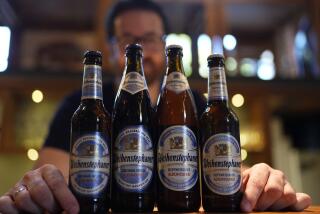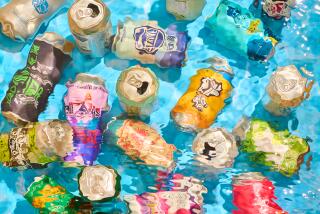Brewers Are Counting Carbs
- Share via
Cutting calories used to be enough for U.S. beer makers to lure Americans watching their waistlines.
Now they have to count carbs too. But they’re not complaining.
Not since Miller Brewing Co. made light beer socially acceptable with its “tastes great, less filling” campaign has the beer industry been as excited as it is now about a growing line of low-carbohydrate beers.
“It’s been the most successful new product since light beer,” said Benj Steinman, editor of Beer Marketers Insight. “This is a phenomenon and no one really knows how high is high, but no one really knows when it’s going to be over.”
Michelob Ultra, the first major brand in the low-carb beer niche, now has a 2.1% share of supermarket beer sales, according to its brewer, Anheuser-Busch Inc. Rolling Rock’s brewer recently celebrated the shipment of 1 million cases of Rock Green Light in less than three months after its launch. In March, Coors Brewing Co. plans to enter the low-carb market with Aspen Edge in 10 states.
Although it’s too early to tell how big a share of the market the low-carb beer sector will claim, analysts say there are already more than a dozen low-carb beers competing for shelf space, and more brewers plan to join the trend.
“If I were guessing, every major brewery probably had a recipe they were testing,” said Julie Bradford, editor of All About Beer magazine.
Industry analysts, however, are divided about the staying power of low-carb beer. Bradford predicts that the low-carb beer sector will grow mainly at the expense of the light beer sector.
The industry generally recognizes light beers as having low calorie counts; low-carb beers are touted as having fewer carbohydrates. Beer experts say half the estimated $60-billion to $70-billion domestic beer market is from light beer sales.
The beer battle also may confuse consumers as companies compete over which brand of beer has the fewest carbs. Rock Green Light has 2.6 grams of carbohydrates and 91 calories. Michelob Ultra advertises 2.6 grams of carbohydrates and 95 calories.
Companies are catering to beer drinkers like Bill Trogler, a 44-year-old police detective who washed down a plate of fried clam strips with a glass of regional brew I.C. Light during the lunch rush in downtown Pittsburgh.
“It tastes good. I drink light to try to keep my weight down,” Trogler said. I.C. Light is made by Pittsburgh Brewing Co., maker of Iron City beer.
At Primanti Bros. sandwich shop, engineer Ed Gourley, 34, said Yuengling, a regional lager, is his beer of choice but he’s open to the idea of low-carb beers after shedding 20 pounds since August.
“I think if it’ll keep the fat off me, that’d be great,” Gourley said.
Low-carb beer makers are looking for specific market segments to target, such as female drinkers with active lifestyles. Michelob Ultra will become the official beer of the LPGA Tour next year.
And instead of settling for Rolling Rock’s customer core -- men ages 24 to 29 -- Rock Green Light hopes to appeal to the health-conscious, said Jon Genese, director of marketing for Rock Green Light. The beer is being advertised in men’s lifestyle magazines, and Labatt USA, which owns Rolling Rock maker Latrobe Brewing Co., will air national television commercials for Rock Green Light in February.
“We felt in order for us to make an impact and to be able to survive, we needed to be quick to market,” Genese said.
Coors Brewing hopes to take Aspen Edge nationwide by the end of the year. And Miller Brewing has remarketed Miller Lite as a low-carb, low-calorie beer in ads.
Bradford said one drawback to the low-carb trend is the misconception that beers are high in calories. She says the average 12-ounce beer contains only 150 calories.
“My personal view is drink a full-flavor beer and skip the nachos,” Bradford said.
More to Read
Inside the business of entertainment
The Wide Shot brings you news, analysis and insights on everything from streaming wars to production — and what it all means for the future.
You may occasionally receive promotional content from the Los Angeles Times.









